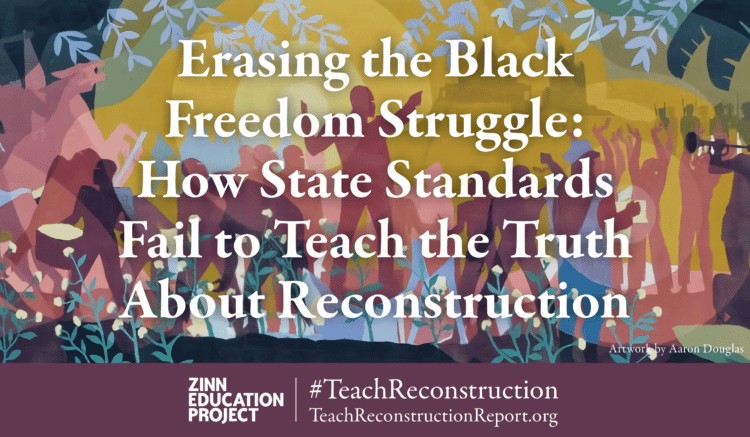Signatures
This is the list of people who have signed the pledge or petition to date.
Monique Augustine | Decatur, GA
Lissette Gordon | Chino, CA
Not only does it explain many of this countries remaining issues, we need to teach real history in our schools. Pieces of history and revisionist history must go!
Sarah Kissel | Somerville, MA
Emily Stewart | Jupiter, FL
It is a pivotal time in America that has shaped racial inequalities. It is important in understanding how the misconception of equality while suppressing black America at the time of reconstruction is still playing a part in how people converse about the topic of racism as well as in the division of America.
Chris Braund | Charlotte, NC
Julianna Kershen | Norman, OK
Teaching about Reconstruction era history and politics is pivotal for young people to understand the structures and systems that were put in place that then created inequities and promulgated racist interactions in the 20th-century. Reconstruction era history is also vital to understanding the concept of a two-party system, and how political parties shift alliances and beliefs systems over time. Young people need to be asking questions about our political system and of the people who are powerful players in running our government. How did these people come to believe the things they believe? What does it really mean to represent the “Democratic” or the “Republican” party? What are the histories of those parties? All of these questions are rich opportunities to investigate history. The Reconstruction era offers a rich way to compassionately and interactively understand our country’s history and present. Of course it should be taught in schools. Of course.
Ashley Young | Tampa, FL
Rose Vigil | Hyattsville, MD
Reconstruction was simultaneously an era of black prosperity and new, Black-led governments in the South, but also an era of extreme violence and pushback to civil rights. It's important to learn about reconstruction so that we can clearly examine the 20th-century civil rights movement and understand the crucial background.
Lindsey Pollock | Houston, TX
Benjamin Miller | Orlando, FL
Lester Leavitt | Fort Lauderdale, FL
I teach students who are made up of 40% Black, 27% Latinx, 3% AAPI, and about 24% anglos. These students need to know how those who came before them were systemically marginalized. They also need to understand that unless their generation brings in reparations, how they will continue to struggle against self-perpetuating wealth inequality for generations to come.
Collin Ray | Ashburn, VA
Deborah Nitasaka | Glen Ellen, CA
Sandra Rigsbee | Chicago, IL
Jon McFarlane | Queens Village, NY
Diana Grimes | Oakland , CA
Shannon Erickson | Madison, WI
Ayanna Taylor | Warren, NJ
Catron Booker | Evanston, IL
Tracey Witherspoon | Marshfield, VT
"History, despite its wrenching pain, cannot be unlived, but if faced with courage, need not be lived again.” -Maya Angelou
Lindsay Colf | St. George, VT
Lindsey Martin | Brentwood, TN
Understanding Reconstruction is crucial to understanding how systematic racism was built in our country and the ways that people of color have been and continue to be disadvantaged. We need to understand this so that we can move towards true equity in our country.
Kelly Hutchinson | East Providence, RI
Pablo Vergara | Brooklyn, NY
Sanna Towns | Inver Grove Heights, MN
Students need to learn about the brief period of time when America almost became a time of equality for all of its citizens. They also need to understand how the destruction of Reconstruction led to many of the systemic forms of racism that we experience today.







Twitter
Google plus
LinkedIn